#learn chinese
Text
language learning is such a personal thing that there is no “right” or “wrong” way of doing it. it’s whatever works on bringing YOU closer to YOUR goal.
you want to watch tv shows but don’t really care for speaking with others? yay!! no speaking practice needed.
you want to learn quickly for an upcoming trip? yay! text book phrases and simple grammar.
you’re a beginner and it’s been 10 years? 2 weeks? 6 months? it doesn’t matter. as long as you are working towards bringing YOURSELF closer to what YOU want to achieve, you have succeeded: you are succeeding; you are doing great.
i find that so much demotivation comes from comparison and/or trying to follow other's advice too closely. if anki decks don't work for you, that's fine! if duolingo works well for you, then use it!
this language learning thing, it should be enjoyed. in the sea full of deceptive polyglot stories and videos on top of videos attempting to understand how to learn languages in "the fastest way possible" sometimes we should sit back and ask ourselves, "when is just learning things, enough"?
with that i hope you all continue working towards your dreams! whether you want to become a translator or just watch a few more movies in your target language, you can do it. i know you have it in you.
#langblr#studyspo#language#languages#language learning#learn chinese#learn french#learn german#learn korean#polyglot
784 notes
·
View notes
Text
my Mandarin teacher has been giving us tongue twisters recently to help our pronunciation so I thought I'd share them:
first the classic:
四是四,十是十,
十四是十四,
四十是四十,
他们不是四十四
(sì shì sì , shí shì shí,
shí sì shì shí sì,
sì shí shì sì shí,
tā men bùshì sì shí sì)
four is four, ten is ten,
fourteen is fourteen,
forty is forty,
they are not forty-four
and then these two specifically focused on nasal finals:
青青山上一根藤,
青藤底下挂铜铃,
风吹藤动铜铃动,
风停藤停铜铃停
(qīngqīng shān shàng yì gēn téng,
qīng téng dǐ xià guà tóng líng,
fēng chuī téng dòng tóng líng dòng,
fēng tíng téng tíng tóng líng tíng)
On a green mountain there is a vine,
Under the green vine hang copper bells.
The wind blows, the vine moves, the copper bells move.
The wind stops, the vine stops, the copper bells stop.
扁担长,板凳宽,
扁担要绑在板凳上,
板凳不让扁担绑在板凳上,
扁担偏要绑在板凳上。
(biǎn dan cháng, bǎn dèng kuān,
biǎn dan yào bǎng zài bǎn dèng shàng,
bǎn dèng bú ràng biǎn dan bǎng zài bǎn dèng shàng,
biǎn dan piān yào bǎng zài bǎn dèng shàng)
The bamboo pole is long, and the wooden bench is wide,
The bamboo pole wants to be tied to the wooden bench,
The wooden bench doesn't let the bamboo pole be tied to it,
But the bamboo pole insists on being tied to the wooden bench
#i'll update as she gives us more#mandarin#tongue twisters#learn mandarin#chinese#learn chinese#langblr#chinese langblr
330 notes
·
View notes
Text
50+ fundamental crime, suspense, & mystery Cdrama vocab words

I'm currently watching 《模仿犯》, so I was inspired to put together this list of essential vocab for 犯罪剧/悬疑剧/推理剧. I tend to gravitate towards dramas that fall into these genres.
I've sorted the words into categories. These were determined by vibes only. Definitions are adapted from MDBG, my loyal companion for nearly 10 years.
The Case
案子 ànzi - case / law case / legal case / judicial case
案件 ànjiàn - case / instance
办案 bàn'àn - to handle a case
破案 pò'àn - to solve a case
报案 bào'àn - to report a case to the authorities
命案 mìng'àn - homicide case / murder case
作案 zuò'àn - to commit a crime
现场 xiànchǎng - the scene (of a crime, accident etc) / (on) the spot / (at) the site
证据 zhèngjù - evidence / proof / testimony
真相 zhēnxiàng - the truth about sth / the actual facts
The Investigation
厘清 líqīng - to clarify (the facts) / clarification
线索 xiànsuǒ - trail / clues / thread (of a story)
细节 xìjié - details / particulars
痕迹 hénjì - vestige / mark / trace
追踪 zhuīzōng - to follow a trail / to trace / to pursue
追问 zhuīwèn - to question closely / to investigate in detail / to examine minutely / to get to the heart of the matter
排除 páichú - to eliminate / to remove / to exclude / to rule out
嫌疑 xiányí - suspicion / to have suspicions
怀疑 huáiyí - to doubt (sth) / to be skeptical of / to have one's doubts / to harbor suspicions / to suspect that
跟踪 gēnzōng - to follow sb's tracks / to tail / to shadow / tracking
不对劲 búduìjìn - fishy / wrong / not right
隐瞒 yǐnmán - to conceal / to hide (a taboo subject) / to cover up the truth
The Victim
被害者 bèihàizhě - victim (of a wounding or murder)
受害者 shòuhàizhě - casualty / victim / those injured and wounded
幸存者 xìngcúnzhě - survivor
失踪 shīzōng - to be missing / to disappear / unaccounted for
消失 xiāoshī - to disappear / to fade away
绑架 bǎngjià - to kidnap / to abduct / to hijack / a kidnapping abduction / staking
遗体 yítǐ - remains (of a dead person)
尸体 shītǐ - dead body / corpse / carcass
拯救 zhěngjiù - to save / to rescue
寻人启事 xúnrénqǐshì - missing persons notice
The Perpetrator
嫌疑犯 xiányífàn - a suspect
嫌疑人 xiányírén - a suspect
歹徒 dǎitú - evildoer / malefactor / gangster / hoodlum
凶手 xiōngshǒu - murderer / assassin
一伙儿的 yìhuǒrde - in on it together
开枪 kāiqiāng - to open fire / to shoot a gun
鬼鬼祟祟 guǐguǐsuìsuì - sneaky / secretive / furtive
可疑 kěyí - suspicious / dubious
认罪 rènzuì - to admit guilt / to plead guilty
自首 zìshǒu - to give oneself up / to surrender (to the authorities)
下落 xiàluò - whereabouts / to drop / to fall
动机 dòngjī - motive / motivation
犯罪 fànzuì - to commit a crime / crime / offense
The Police
报警 bàojǐng - to sound an alarm / to report sth to the police
警察 jǐngchá - police / police officer
警方 jǐngfāng - police
警官 jǐngguān - constable / police officer
刑警 xíngjǐng - criminal police (abbr. for 刑事警察)
被捕 bèibǔ - to be arrested / under arrest
包围 bāowéi - to surround / to encircle / to hem in
监控 jiānkòng - to monitor
检查 jiǎnchá - inspection / to examine / to inspect
调查 diàochá - investigation / inquiry / to investigate
排查 páichá - to inspect / to investigate one by one
质问 zhìwèn - to question / to ask questions / to inquire / to bring to account / to interrogate
前科 qiánkē - criminal record / previous convictions
Bonus: Here's a list of dramas I have seen/am watching in these categories:
《想见你》 Someday or One Day
《开端》 Reset
《消失的孩子》 The Disappearing Child
《她和她的她》 Shards of Her
《镇魂》 Guardian
《模仿犯》 Copycat Killer
《不良执念清除师》 Oh No! Here Comes Trouble
Now go forth and enjoy some more dramas! I'm a slow watcher, so I add new shows to my watch list faster than I can finish them.
#vocab list#cdrama#cdramas#chinese drama#taiwanese drama#chinese#mandarin#mandarin chinese#chinese language#studyblr#langblr#language study#language learning#chinese studyblr#chinese langblr#mandarin studyblr#mandarin langblr#study chinese#study mandarin#learn chinese#learn mandarin#studying chinese#learning chinese#studying mandarin#learning mandarin#languages#language blog#languageblr#chinese vocab#mandarin vocab
628 notes
·
View notes
Text
The directional "下/上/出/去/来" puzzle guide
I for one still confuse the usage of 出来 and 出去 and other similar structures so here's a guide to slightly depuzzle this puzzle.
上去 (Shàngqù): To go up and away from the speaker
下去 (Xiàqù): To go down and away from the speaker
出去 (Chūqù): To go out and away from the speaker
出来 (Chūlái): To go out and towards the speaker
上来 (Shànglái): To go up and towards the speaker
下来 (Xiàlái): To go down and towards the speaker
过来 (Guòlái): To ask someone to come over to the speaker
过去 (Guòqù): This one is tricky as it can have a few meanings so here are some random examples.
Movement away from the speaker e.g. 我来这家公司工作已经过去五年了= I have been working in this company for the past five years
Movement in time during the past e.g. 过去的年份里,公园里有很多树和花= In the past years, there were many trees and flowers in the park
Here's an illustration I made (it's been a while lol) to make it less (?) confusing:

#chinese#chinese grammar#mandarin langblr#chinese studyblr#learn chinese#studyblr#college#slavic roots western mind#student life#aesthetic#travel blog#study motivation#student#college life#study blog#langblr#language#linguistics
180 notes
·
View notes
Text
all my mandarin dictionaries (and dictionary-adjacent books)
Through chatting with @don-dake and @cherrymintvampyyri, I've come to realize that I might own a less than normal number of Mandarin dictionaries. So, here's a post about all of them.
I do have two basic bilingual dictionaries (Mandarin/English): the Langenscheidt pocket dictionary and the DK visual dictionary. These are quite easy to buy and not that interesting imo, so I'm not gonna talk further about them.
I'm also going to include a couple books that aren't technically dictionaries, but are rather about etymology of characters, and that's close enough to count for me.
Okay, let's get on to the interesting stuff!
1. What Character is That? An Easy-Access Dictionary of 5,000 Chinese Characters by Ping-gam Go (second edition, 1995)
bilingual
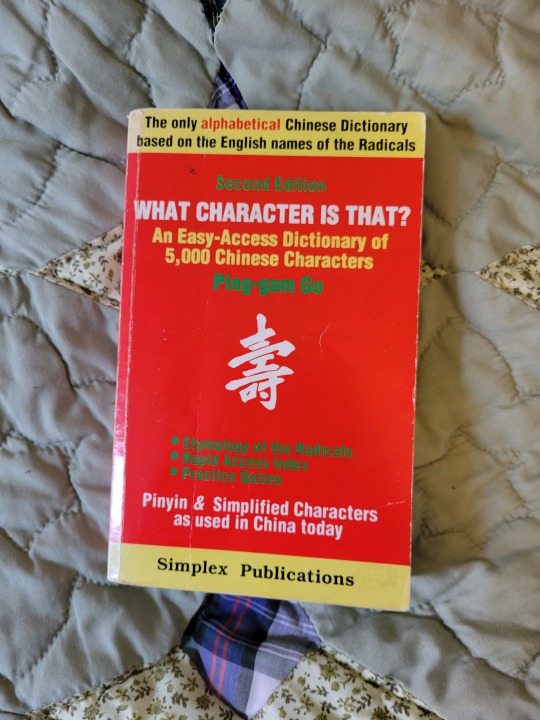
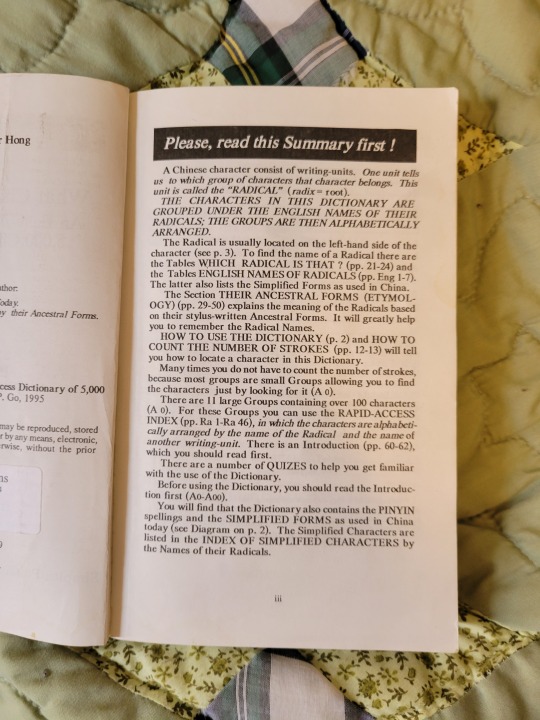
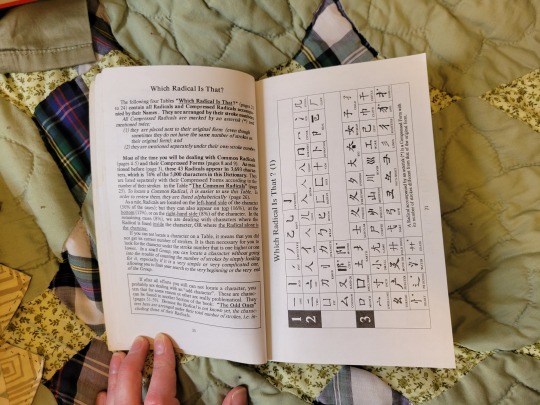
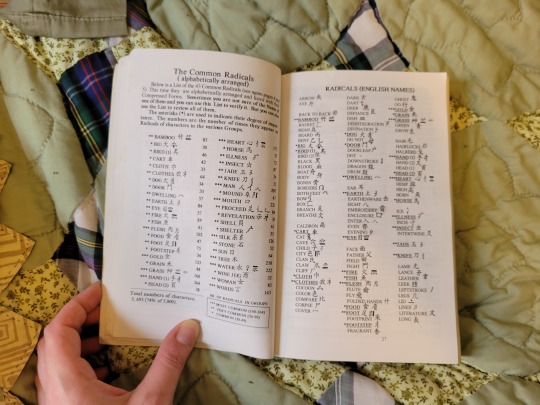
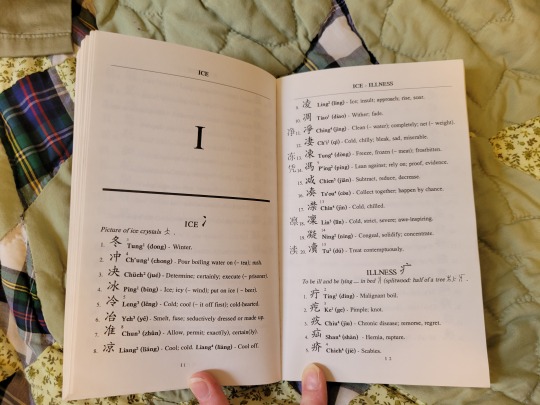
This strange little dictionary was gifted to me by a nun who went to high school with my grandma and later lived in China as a missionary. It's organized alphabetically based on the English translation of each radical?
I have not used this dictionary for actual reference ever, because I flipped through it once and realized that it was absolutely whack. But it's cool to have I guess.
2. 新华字典 第11版
monolingual
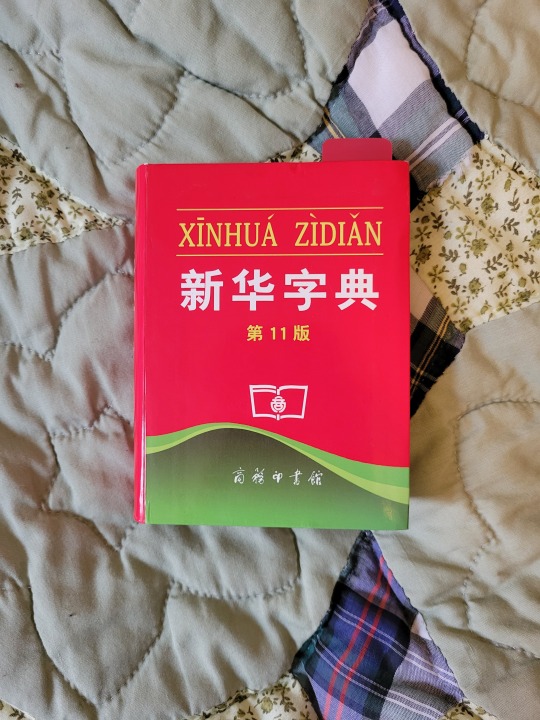
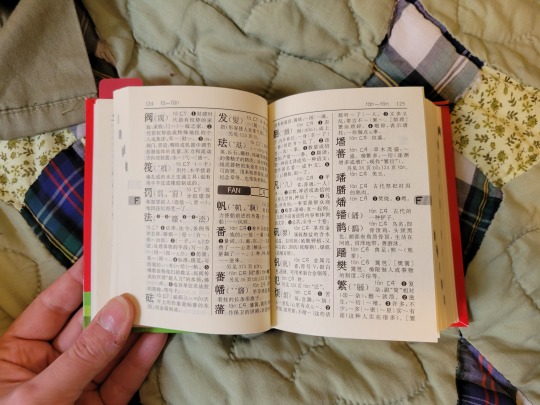
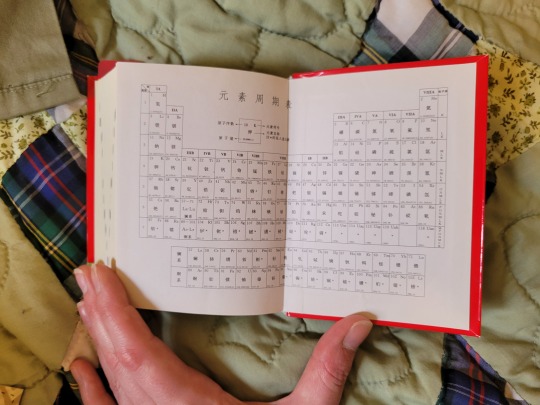
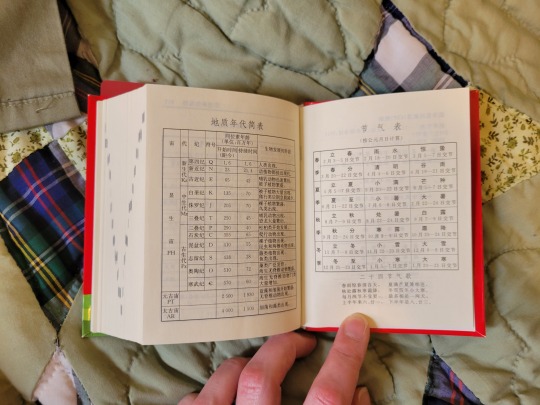
This little guy was gifted to me by a Chinese classmate back when I was in college. It's a 字典, so it's just focused on defining individual characters and providing some words featuring that character. Despite being a mainland dictionary, it also has 注音 next to each character for some reason.
It's got some neat stuff towards the back, like the periodic table and a chart of all the 節氣 solar terms.
3. 小学生全笔顺 同义词 近义词 反义词 组词 造句 成语 多音多义字 词典
monolingual
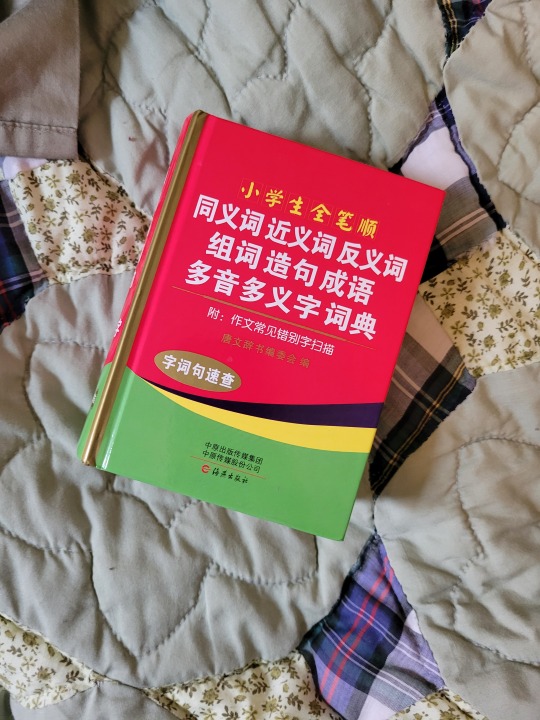
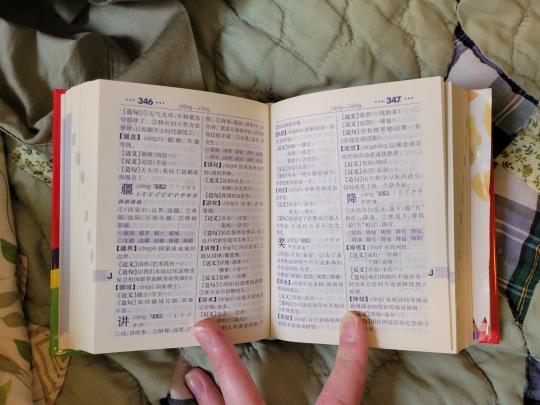
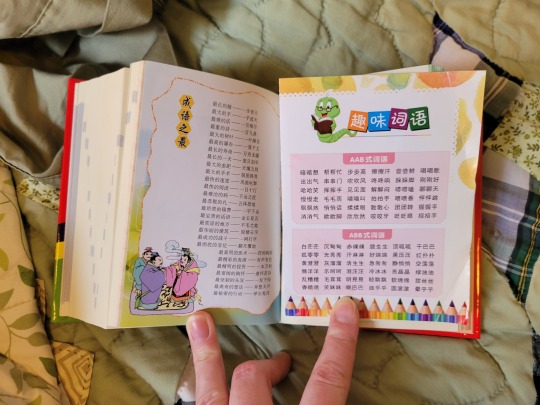
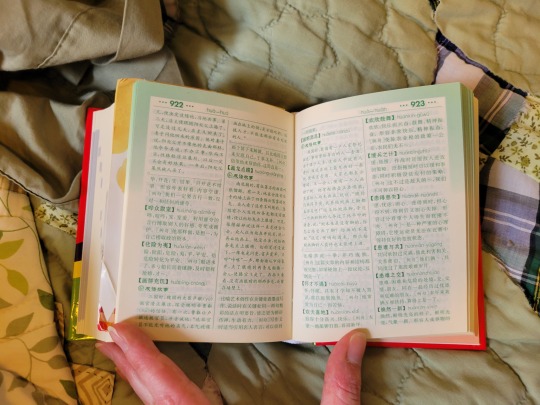
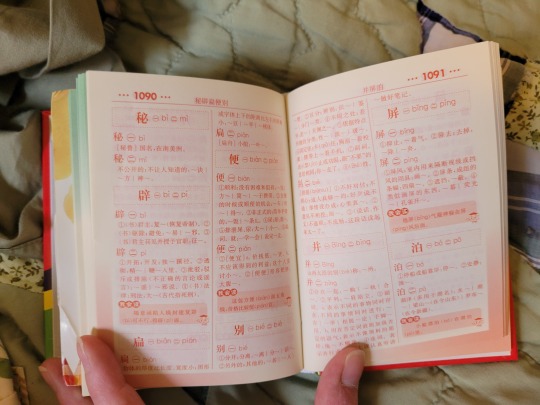
Whew, that's a mouthful. This is an actual 词典, so it defines full words. It also provides example sentences, synonyms, antonyms, and close equivalents. Then there's a section for idioms, and another section for 多音多义字.
There's also this nifty little insert with examples of words/phrases that follow common patterns of repetition.
4. 新现代汉语词典
monolingual
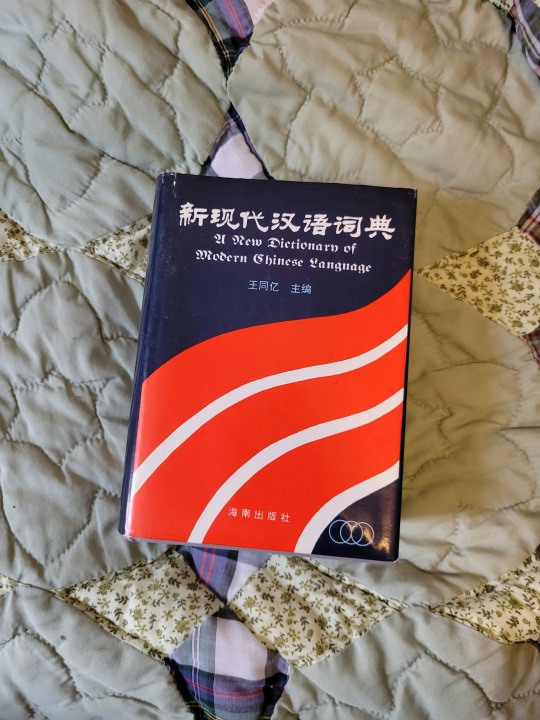
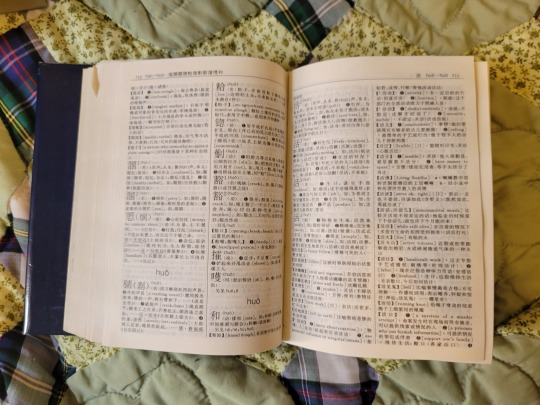
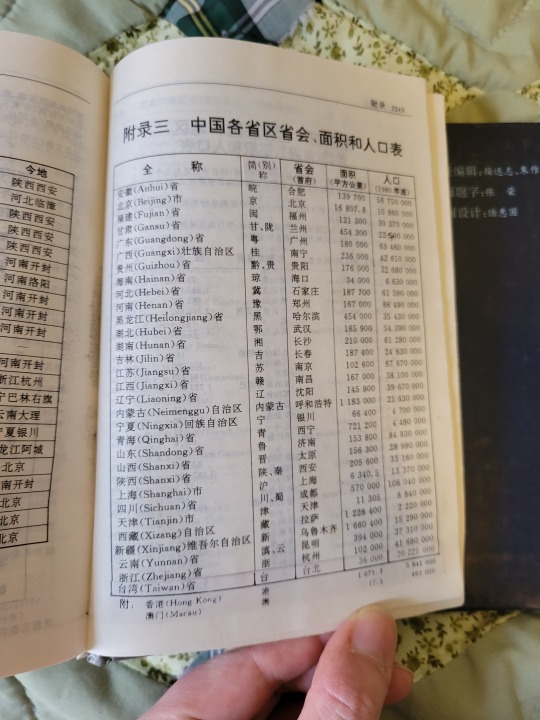
I picked up this chunky guy from a used bookstore down the street from me (the owner of the store passed last year, and the store is no longer there unfortunately). This is a fairly normal dictionary, it's just bigger than my others and has more words listed in it.
One thing I also noticed is that this chart towards the end of the dictionary apparently had a strip of paper pasted on the bottom. It doesn't seem like something I can peel up without damaging the paper under it, and when I shine a flashlight through the page I can't make out any major differences between what's on the sticker and what might be on the page under it. So my best guess is there might have been some damage to the text on the page?
5. 商务馆学汉语近义词词典 The Commercial Press Guide to Chinese Synonyms
monolingual
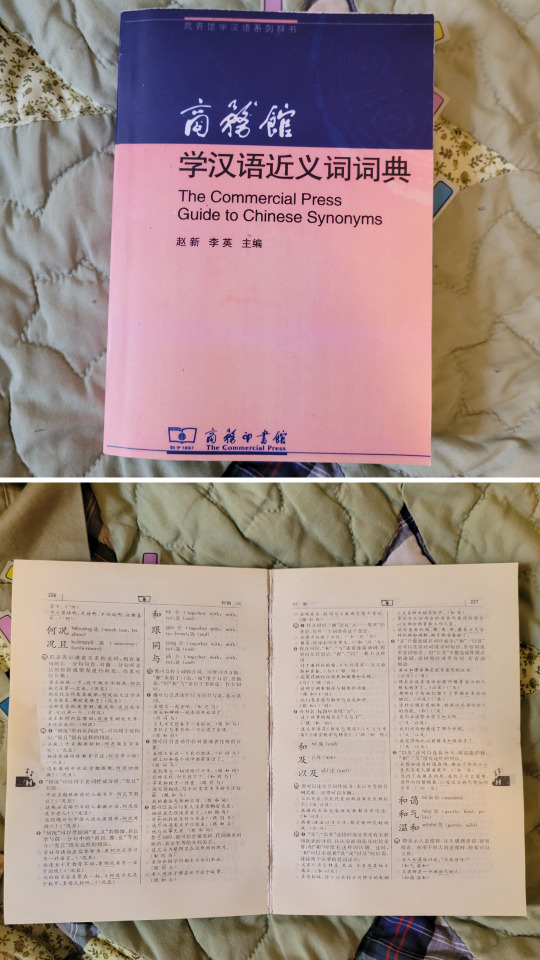
This book is easily the one I reference the most. As the name suggests, the book is all about synonyms. It takes sets of 2+ similar words and thoroughly explains the similarities and differences between them all. There's plenty example sentences, with notes about whether the synonyms can be used interchangeably in certain contexts.
It's a great resource, but I had a bit of trouble getting my hands on a copy. It's possible that in the years since I bought it there have been more copies made available for sale though.
these next two are books I haven't explored too much since they are old and the binding is incredibly fragile and starting to fall apart. just opening them is stressful.
6. 漢字分解 Chinese Characters Explained by F.X. Keelan (aka 康愛玲修女) (1967?)
bilingual
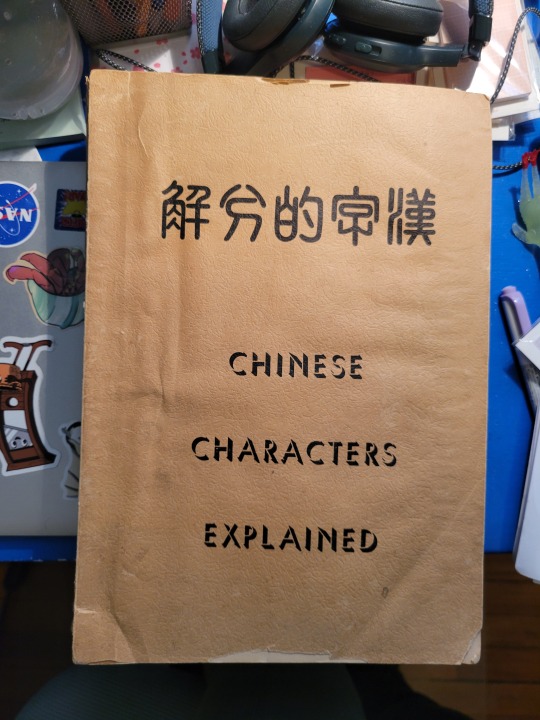

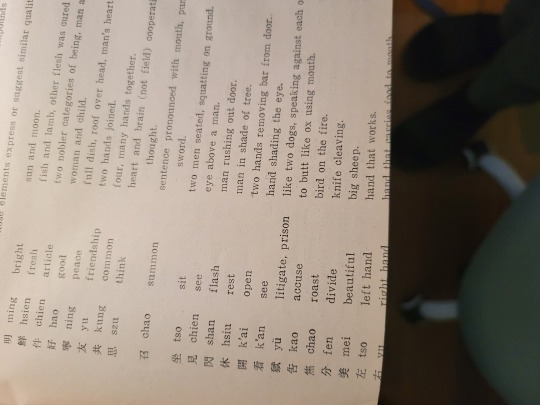
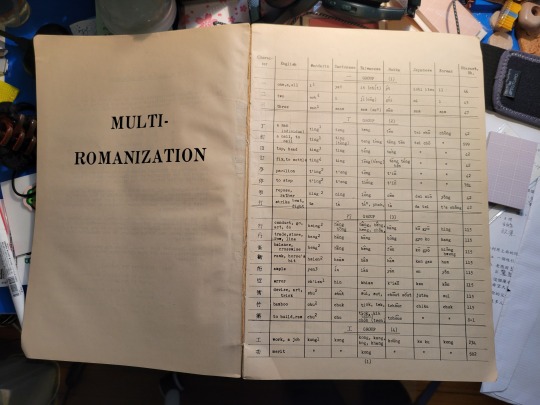
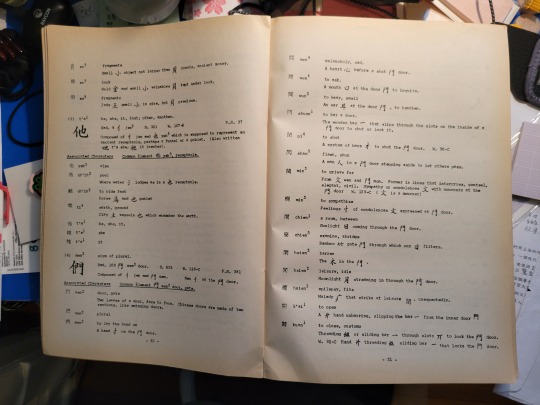
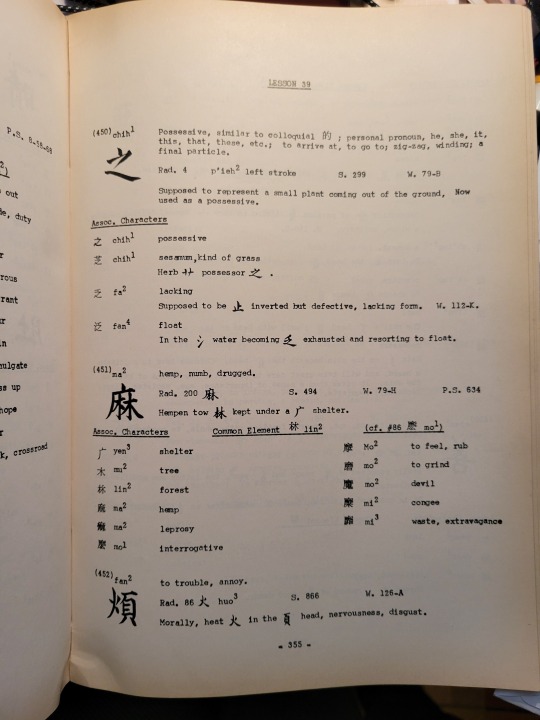
This book was also gifted to me by the nun who went to school with my grandma, and appears to also have been written by a nun! Based on what I've found from Google, this book was published in 1967.
Rather than a dictionary, this book is "a compilation intended as an aid in grouping and remembering [Chinese characters] with a view in acquiring a reading knowledge of Chinese"(p. iii). It aims to break down characters into radicals and giving similar/related characters. It's apparently the final installment in a 4 part Mandarin Course.
This book uses traditional characters. According to Google Books, the publisher is 光啓出版社, which is a Taiwanese organization. The book includes a very long table that has Mandarin, Cantonese, Taiwanese, Hakka, Japanese, and Korean pronunciations for (what seems to be) every character mentioned in the book. The intro mentions that this is so the course is more "accessible" for speakers of other East Asian languages.
Also, look at that printing error in the third photo! The text got cut off at the bottom of the page.
7. The Structure of Chinese Characters by John Chalmers (second edition, 1911)
bilingual
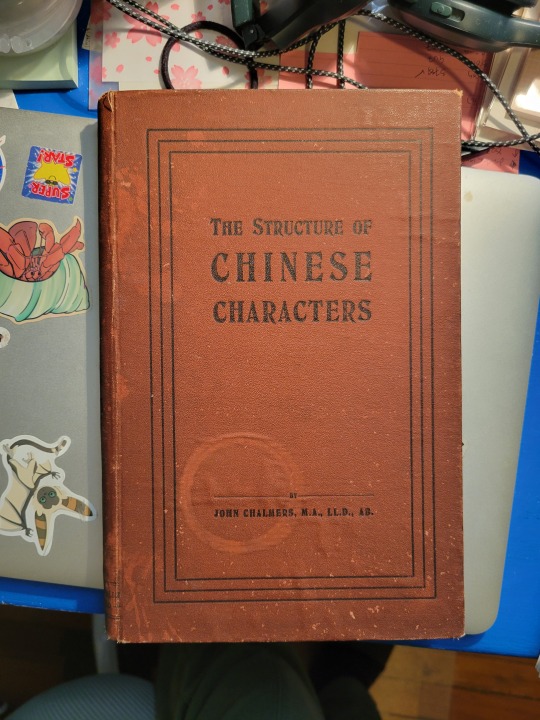
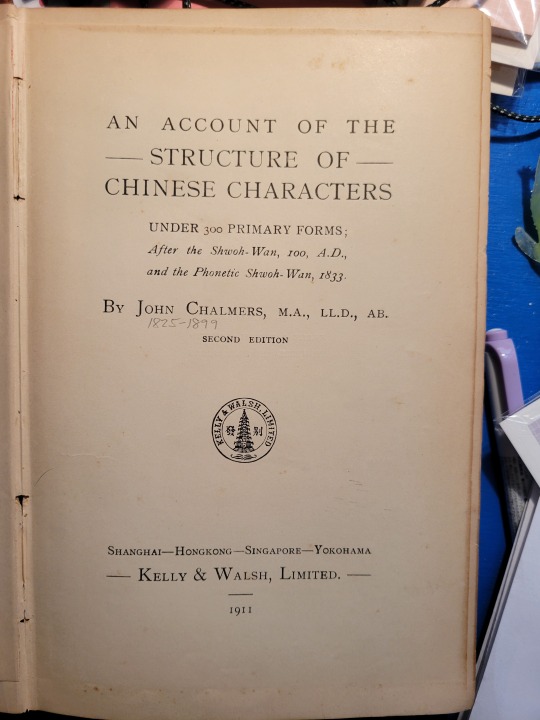
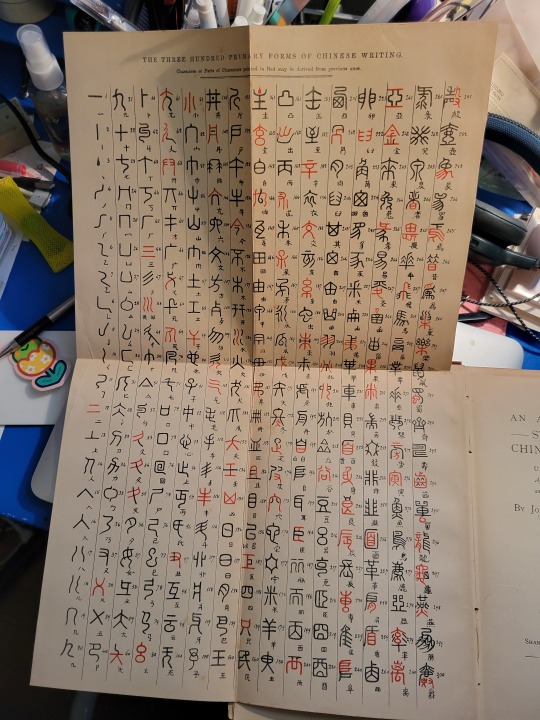
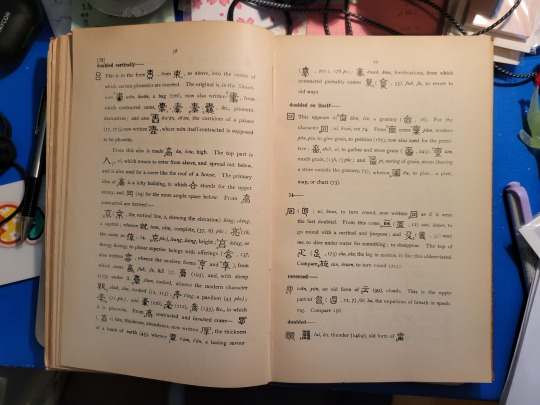
This final book is the oldest of the bunch, and was gifted to me by my boss's boss for some reason? She found it in a used bookstore apparently.
This book also uses traditional characters, because simplified characters just weren't a thing yet in 1911. This book is falling apart, and opening it stresses me out. It creaks whenever I open it.
Going by the title page, the full title of this book is An Account of the Structure of Chinese Characters Under 300 Primary Forms; After the Shwo-Wan, 100 A.D., and the Phonetic Shwoh-Wan, 1833. It was published by Kelly & Walsh, which was a Shanghai-based publisher.
Someone very kindly penciled in the years the author was alive: 1825-1899. John Chalmers was apparently a Scottish missionary (bc of course he was) who apparently popularized the term "Cantonese". This book that I own in particular was originally published in 1882.
It is, as the very long title suggests, an analysis and etymology of 300 common components
It also has a nifty fold-out of all 300 "primary forms" in seal script.
69 notes
·
View notes
Text

GUYS THIS HAS BEEN THE BEST WEEK OF MY LIFE I SWEAR. I THOUGHT THEY WOULDNT LET ME KNOW FOR A WHIIILE OMGOMG IM GOING TO TAIWAN
#studyblr#study blog#langblr#langblog#language learning#languageblr#chinese langblr#mandarin langblr#study abroad#taiwan#chinese language#mandarin chinese#mandarin studyblr#studyblr community#chinese studyblr#learning chinese#learn chinese#mandarin study#learn mandarin#studyabroad#exchange student#student life#uniblr#university#college
97 notes
·
View notes
Text
Speak DECENT CHINESE in 4 months - 8 easy tips
______
1. Have someone to guide you to get good pronunciation habits. It is almost impossible to re-learn bad habits later so make sure you get your pronunciation right from the beginning. I mean the pronunciation of the sounds, not the tones. Tones take more time to get used to and you can't rush it - but try the best you can. Some tutors don't bother too much about the pronunciation so make sure you find someone who is strict about that, you will be grateful later. Also get confident in pinyin, you will need it.
2. Understand the composition of the sentences. The word order is super easy and it stays the same all the time (the question and informative sentences have the same word order). I have a formula for the word order but I won't reveal it here, it is one of the secrets I keep for my students and people who use my materials.
3. Understand that there are no tenses in the sense we think about them in English and other languages. Learn to express future, potential future, finished action, change of state, experience in the past and circumstances of the event. See the difference between action verbs and verbs of state.
4. Learn to use modal verbs and conjuctions.
5. Build usable vocabulary based on the fact that everything in Chinese is interconnected.
6. Understand 就, 才,的 and 得
7. Don't learn grammar rules and words separately. Learn functional practical sentences that will serve you as examples of the grammar structures (then you just need to change the words in these sentences).
8. Develop your listening skills - that is very important. For that there are Youtube channels and podcasts on Spotify (and in my materials the audio part also plays an important role). You can listen to Chinese radio stations just to get the feeling of the language.
______
After 3-4 months you should feel pretty confident in normal conversations if you study regularly under competent guidance.
______
R-evolutionary learning materials and resources: https://linktr.ee/chineseffect
MAGIC PLAYBOOK for beginners
#learn chinese#learn mandarin#chinese langblr#mandarin langblr#edublr#mandarin#chinese#mandarin edublr#langblr#chinese vocabulary#mandarin chinese#chinese edublr#learning mandarin#learning chinese#study chinese#mandarin vocabulary#study mandarin#汉语#chinese studyblr#beginners chinese#chinese for beginners#learning tips#chinese tips#mandarin tips
243 notes
·
View notes
Text
i really enjoy taking notes for the sole fact that after i finish, i just love the way i can look back at all my work. this is double as satisfying when there is another writing system involved im like wow. i can read that...
#learn chinese#langblr#language#language learning#studyblr#studyspo#studying#study blog#study motivation
66 notes
·
View notes
Text
instagram
32 notes
·
View notes
Text
Vocabulary List #58
夕 [xī] - evening
名 [míng] - name
千 [qiān] - a thousand
舌 [shé] - tongue
不 [bù] - no; not
的 [de] - belonging to
大 [dà] - big
又 [yòu] - again
粥 [zhōu] - congee
茶 [chá] - tea
橙子 [chéngzi] - orange (the fruit)
子 [zi] - child; noun suffix
了 [le] - completed action marker
错了 [cuòle] - wrong
对了 [duìle] - correct; oh, by the way...
土 [tŭ] - earth; dust
#langblr#language#languages#chinese#chinese langblr#learn chinese#learning chinese#vocabulary list#vocab list#chinese vocab list#memrise
42 notes
·
View notes
Text
BEST TIP Learning Languages ;
SIMPLICITY is KEY. Simplify the learning process.
MAKE LEARNING A LANGUAGE ;
Simple & understandable.
LEARNING TIP: DO NOT LEARN WHAT YOU DO NOT USE.
Avoid learning useless vocabulary. Do not learn the things that are truly of no use for you in your daily life.
Think about it …. In reality,
if you NEVER use it ... simply don’t use it .. don’t learn it.
Learn what you will use, and nothing extra.
For now - Just focus on what you use on a daily basis.
Here’s great exercise to follow this tip ;
Create a realistic list of vocabulary you use day to day - A LIST of only the things you say the most, on a DAILY BASIS.
Focus on learning this list in your target language.
Learn this list
ABOVE ALL ELSE.
Because you will be forced to learn how to say only relevant and useful sayings.
You will learn only WHAT YOU ACTUALLY WILL USE.
LOGICALLY, YOU WILL USE THIS LIST, DAILY!
AND YOU WILL HAVE AN EASIER TIME PRACTICING, BECAUSE YOU WILL ACTUALLY USE THE LIST!
Try it ... and see how much this focus shift can make a worlds difference.
#language#language learning#foreign languages#russian langblr#Korean langblr#french langblr#japanese langblr#german langblr#langblog#languageblr#spanish langblr#swedish langblr#english language#french language#languages#lang#learn Russian#learn chinese#learning english#learning languages
336 notes
·
View notes
Text
one thing about learning languages is that yes, learning in itself is fun but what’s even greater is the fact that all your other interests and hobbies can be looked at with another shade of light. I personally love philosophy and to be able to read another language’s nuances and concepts and understand it more than you ever could with a translation? incredible.
#language learning#languages#langblr#learn chinese#learn french#learn german#learn korean#learn spanish#study korean#language#polyglot#philosophy
442 notes
·
View notes
Text
Word of Honor Vocab - Episode 2
after much too long, here we go
若 (ruò) - as if; like
美若天仙
诚意 (chéng'yì) - good faith/sincerity
表明诚意
变数 (biàn'shù) - variable
此事变数很大
步法 (bù'fǎ) - footwork
你的步法很厉害
偏偏 (piān'piān) - lightly/airily; unrestrained
蝴蝶在花丛中偏偏飞舞
翩翩少年
仙 (xiān) - celestial being; immortal
凡人和神仙
眼疾 (yǎn'ji2) - eye trouble/ eye disease
我爷爷有眼疾所以它不看清楚
飘飘 (piāo'piāo) - to float about/to flutter
红旗飘飘
流风 (liú'fēng) - customs handed down from past generations
流风余韵
仿佛 (fáng'fú) - seemingly/as if
这事她仿佛已经知道了
轻 (qīng) - light (weight)
工作很轻
所谓 (suǒ'wèi) - what is called/what is known as; so-called
所谓团结,并非一团和气
他所谓的朋友都背弃了他
壶 (hú) - kettle/pot
壶里是开水
独酌 (dú'zhuó) - to drink alone
如果你很难过,你应该不独酌
尾随 (wěi'suí) - to tag along after
尾随其后
究竟 (jīu'jìng) - outcome/what actually happened
大家都想知道个究竟
妨 (fáng) - hinder/hamper; harm
你试一试也无妨
会妨大事
明示 (míng'shì) - to explicitly instruct
我明示你得做你的功课但是你还没做完了!
傻 (shǎ) - stupid/muddleheaded
吓傻了
剑 (jiàn) - sword
剑柄
拔剑
#as always corrections are welcome#most of the sentences are from pleco but where pleco had none i had to come up with some#i have two more vocab lists planned for word of honor and hopefully i get to them soon#m vocab#mandarin#chinese#mandarin studyblr#mandarin vocab#learn mandarin#learn chinese#chinese langblr#chinese studyblr#mandarin langblr#word of honor#shan he ling#山河令#langblr#chinese language#普通话
132 notes
·
View notes
Text
75 essential single-character verbs (单字动词)

When I started consuming more native Chinese content, I quickly discovered an area in which my knowledge was lacking: single-character verbs. In my experience, it’s very easy to focus on learning words consisting of two or more characters and overlook single-character words.
Driven by curiosity, I went through my Anki deck (and also wracked my brain) to generate a list of characters/words that I have learned over the past couple years (roughly). Then I selected 75 verbs that are fairly common and important to know. They skew towards intermediate and advanced vocabulary.
Definitions are from MDBG. For characters with additional meanings that I am not yet familiar with, I have bolded the meanings I want to share.
(1) 抢 qiǎng - to fight over / to rush / to scramble / to grab / to rob / to snatch
(2) 救 jiù - to save / to assist / to rescue
(3) 扶 fú - to support with the hand / to help sb up / to support oneself by holding onto something / to help
(4) 催 cuī - to urge / to press / to prompt / to rush sb / to hasten sth / to expedite
(5) 夹 jiā - to press from either side / to place in between / to sandwich / to carry sth under armpit / wedged between / between / to intersperse / to mix / to mingle / clip / folder / Taiwan pr. [jia2]
(6) 咬 yǎo - to bite / to nip
(7) 砸 zá - to smash / to pound / to fail / to muck up / to bungle
(8) 毁 huǐ - to destroy / to ruin / to defame / to slander
(9) 嚷 rǎng - to shout / to bellow / to make a big deal of sth / to make a fuss about sth
(10) 塞 sāi - to stop up / to squeeze in / to stuff / cork / stopper
(11) 贪 tān - to have a voracious desire for / to covet / greedy / corrupt
(12) 拆 chāi - to tear open / to tear down / to tear apart / to open
(13) 掏 tāo - to fish out (from pocket) / to scoop
(14) 跪 guì - to kneel
(15) 摘 zhāi - to take / to borrow / to pick (flowers, fruit etc) / to pluck / to select / to remove / to take off (glasses, hat etc)
(16) 拎 līn - to lift up / to carry in one's hand / Taiwan pr. [ling1]
(17) 扛 káng - to carry on one's shoulder / (fig.) to take on (a burden, duty etc)
(18) 拽 zhuài - to pull / to tug at (sth)
(19) 愣 lèng - to look distracted / to stare blankly / distracted / blank / (coll.) unexpectedly / rash / rashly
(20) 搂 lǒu - to hug / to embrace / to hold in one's arms
(21) 垮 kuǎ - to collapse (lit. or fig.)
(22) 撑 chēng - to support / to prop up / to push or move with a pole / to maintain / to open or unfurl / to fill to bursting point / brace / stay / support
(23) 甩 shuǎi - to throw / to fling / to swing / to leave behind / to throw off / to dump (sb)
(24) 围 wéi - to encircle / to surround / all around / to wear by wrapping around (scarf, shawl)
(25) 愁 chóu - to worry about
(26) 插 chā - to insert / stick in / pierce / to take part in / to interfere / to interpose
(27) 漏 lòu - to leak / to divulge / to leave out by mistake / waterclock or hourglass (old)
(28) 披 pī - to drape over one's shoulders / to open / to unroll / to split open / to spread out
(29) 歇 xiē - to rest / to take a break / to stop / to halt / (dialect) to sleep / a moment / a short while
(30) 抄 chāo - to make a copy / to plagiarize / to search and seize / to raid / to grab / to go off with / to take a shortcut / to make a turning move / to fold one's arms
(31) 哼 hēng - to groan / to snort / to hum / to croon / humph!
(32) 哄 hǒng - to deceive / to coax / to amuse (a child)
(33) 啃 kěn - to gnaw / to nibble / to bite
(34) 眯 mī - to narrow one's eyes / to squint / (dialect) to take a nap
(35) 趴 pā - to lie on one's stomach / to lean forward, resting one's upper body (on a desktop etc) / (Tw) percent
(36) 揍 zòu - to hit / to beat (sb) / (coll.) to smash (sth)
(37) 蹭 cèng - to rub against / to walk slowly / (coll.) to freeload
(38) 凑 còu - to gather together, pool or collect / to happen by chance / to move close to / to exploit an opportunity
(39) 敲 qiāo - to hit / to strike / to tap / to rap / to knock / to rip sb off / to overcharge
(40) 滑 huá - to slip / to slide / slippery / smooth / sly / slippery / not to be trusted
(41) 碎 suì - to break down / to break into pieces / fragmentary
(42) 盯 dīng - to watch attentively / to fix one's attention on / to stare at / to gaze at
(43) 塌 tā - to collapse / to droop / to settle down
(44) 背 bēi - to be burdened / to carry on the back or shoulder
背 bèi - the back of a body or object / to turn one's back / to hide something from / to learn by heart / to recite from memory / unlucky (slang) / hard of hearing
(45) 数 shǔ - to count / to count as / to regard as / to enumerate (sb's shortcomings)
(46) 按 àn - to press / to push / to leave aside or shelve / to control / to restrain / to keep one's hand on / to check or refer to / according to / in the light of / (of an editor or author) to make a comment
(47) 压 yā - to press / to push down / to keep under (control) / pressure
(48) 亲 qīn - parent / one's own (flesh and blood) / relative / related / marriage / bride / close / intimate / in person / first-hand / in favor of / pro- / to kiss / (Internet slang) dear
(49) 补 bǔ - to repair / to patch / to mend / to make up for / to fill (a vacancy) / to supplement
(50) 舔 tiǎn - to lick / to lap
(51) 拼 pīn - to piece together / to join together / to stake all / adventurous / at the risk of one's life / to spell
(52) 埋 mái - to bury
(53) 抖 dǒu - to tremble / to shake out / to reveal / to make it in the world
(54) 涂 tú - to apply (paint etc) / to smear / to daub / to blot out / to scribble / to scrawl / (literary) mud / street
(55) 抹 mǒ - to smear / to wipe / to erase / classifier for wisps of cloud, light-beams etc
(56) 吞 tūn - to swallow / to take
(57) 拦 lán - to block sb's path / to obstruct / to flag down (a taxi)
(58) 露 lòu - to show / to reveal / to betray / to expose
露 lù - dew / syrup / nectar / outdoors (not under cover) / to show / to reveal / to betray / to expose
(59) 滚 gǔn - to boil / to roll / to take a hike / Get lost!
(60) 扣 kòu - to fasten / to button / button / buckle / knot / to arrest / to confiscate / to deduct (money) / discount / to knock / to smash, spike or dunk (a ball) / to cover (with a bowl etc) / (fig.) to tag a label on sb / (Tw) (loanword) code
(61) 夸 kuā - to boast / to exaggerate / to praise
(62) 挥 huī - to wave / to brandish / to command / to conduct / to scatter / to disperse
(63) 求 qiú - to seek / to look for / to request / to demand / to beseech
(64) 吸 xī - to breathe / to suck in / to absorb / to inhale
(65) 响 xiǎng - echo / sound / noise / to make a sound / to sound / to ring / loud / classifier for noises
(66) 擦 cā - to wipe / to erase / rubbing (brush stroke in painting) / to clean / to polish
(67) 踩 cǎi - to step on / to tread / to stamp / to press a pedal / to pedal (a bike) / (online) to downvote
(68) 撕 sī - to tear
(69) 扫 sǎo - to sweep
(70) 锁 suǒ - to lock / to lock up / a lock (CL:把)
(71) 扎 zhā - to prick / to run or stick (a needle etc) into / mug or jug used for serving beer (loanword from "jar")
(72) 撞 zhuàng - to knock against / to bump into / to run into / to meet by accident
(73) 追 zhuī - to chase / to pursue / to look into / to investigate / to reminisce / to recall / to court (one's beloved) / to binge-watch (a TV drama) / retroactively / posthumously
(74) 抽 chōu - to draw out / to pull out from in between / to remove part of the whole / (of certain plants) to sprout or bud / to whip or thrash
(75) 删 shān - to delete
#vocab list#chinese#mandarin#mandarin chinese#chinese language#studyblr#langblr#language study#learning languages#language learning#chinese studyblr#chinese langblr#mandarin studyblr#mandarin langblr#study chinese#study mandarin#learn chinese#learn mandarin#studying chinese#learning chinese#studying mandarin#learning mandarin#chinese vocab#mandarin vocab#foreign languages#language#languages#language blog#languageblr#language stuff
759 notes
·
View notes
Text
The 然's
突然,虽然,忽然. and the other 然's can often get mixed up, so here's a quick explanation of some of the most common ones!
突然 (Túrán): This means suddenly or unexpectedly
居然 (Jūrán): This kind of means suddenly, but more in the sense of "surprisingly" or to suggest disbelief at something that happened.
忽然 (Hūrán): This also means suddenly or unexpectedly, but it has a more stronger connotation.
既然 (Jìrán): This is a conjunction meaning "since" or "now that"
既然the weather is great, let's go out!
既然 you aren't busy, let's go watch a movie.
不然 (Bùrán): This means "otherwise" or "or else";
You should study, 不然 you won't do well on the exam.
虽然 (Suīrán): This means although or even though.
虽然 I'm not good at singing, I still like to go to the karaoke.
当然 (Dāngrán): 当然 means certainly or definitely and can be used as a reply:
Can you help me with A? 当然!
自然 (Zìrán): This can mean nature or naturally.
China's 自然 is very beautiful.
She speaks Chinese 得很自然.
仍然 (Réngrán): This can mean "still" or "yet".
I仍然 haven't read that book.
依然 (Yīrán): Similar to 仍然, this also means still" or "yet" but it's usually used in more formal and literary works, whereas 仍然 is more often used in spoken language.
果然 (Guǒrán): 果然 can be used to mean "indeed" or "as expected"
This movie is 果然 interesting.
竟然 (Jìngrán): This is an adverb used to suggest surprise or something unexpected.
He竟然forgot her birthday.
显然 (Xiǎnrán): This means "clearly" or "obviously".
This soup 显然 hot.
偶然 (Ǒurán): This means "accidentally" or "by chance".
We 偶然 met at the same cafe.
How many other 然's do you know about? Drop a comment!
#slavic roots western mind#student life#student#study blog#college#college life#travel blog#aesthetic#studyblr#study motivation#chinese#china#study in china#life in china#learn chinese#chinese grammar#grammar#vocabulary#chinese vocabulary#chinese verbs#verbs#verb#chinese studyblr#mandarin langblr#mandarin#mandarin chinese#chinese language#language learning#chinese langblr#language resources
73 notes
·
View notes
Text
Reading Chinese Ebooks on 讀墨 ReadMoo
For the past few years, I've labored under the assumption that I can't read Chinese ebooks because I just can't focus on them. However, I recently saw someone on insta mention the app 讀墨. I was intrigued, and decided to give it a try. And wow, what a shock, I can in fact read Chinese ebooks! I just have to change it to vertical text and make the font very large.
So the past couple weeks I've been trying to read more consistently using 讀墨. The book I started with was slow going at first, which almost made me give up; it was the Chinese translation of The Last Cuentista by Donna Barba Higuera. This book really wasn't for me, and I didn't want to keep reading it. So instead of just giving up, I bought one more book and tried again: 《你的孩子不是你的孩子》 by 吳曉樂 (yes, it is the basis for the Netflix show of the same name).
I devoured the book in under a week. So yeah, I think Chinese ebooks work for me if I like the book.
Below is gonna be an overview of the app, and my thoughts on it so far. It's not comprehensive though, since there's a lot of things on this app I haven't explored yet (like the audiobooks).
***Please note that 讀墨 is a Taiwanese app, and as such it mainly offers books written in traditional characters. There are apparently books written in simplified available, but I haven't explored those since I'm fine reading traditional.***
Buying Books
Buying books is fairly simple. You make an in-app purchase of coins, which you then use to buy books. Note: As of writing this, I have recently recently received a notification from the app that their book purchasing system will be changing soon. Instead of being able to buy the books in the app, you'll have to log in to your account in a browser and buy the books there. The books will apparently then appear on the app for you to read.
As it stands, 210 coins costs $10.99, and the books I've bought have ranged in price from 210 to about 300 coins. That means the books cost ~$11-$16, just like a regular book. This could be pricey, but since I'd otherwise be paying for international shipping if I were buying a physical copy, this feels like a bargain to me. (For me, shipping books from Taiwan/China to the US typically doubles the price of the purchase rip)

Once you buy the book, it's in your library for you to start whenever you please.
As for browsing for books, I haven't gone too in-depth yet. I went in to 讀墨 with a TBR and went for books off that list exclusively. When it comes to buying books online, I almost always go on whatever site I'm buying from with a list of the books I'm thinking of buying. I get recommendations elsewhere (e.g., Goodreads or insta).
Reading Books
The 讀墨 reading interface is pretty typical for an e-reader app. What makes me like it way better than other apps I've used is that it has a lot more customization options.
For starters, you've got 6 options for page/text color. There's the typical black, white, and sepia, but there's also blue and green! I use the 奶綠 option, since I don't like having such a stark contrast between the text and the background when reading on my phone for long periods.
Then there's the options for changing the text size and spacing. You can make it bigger or smaller as you please, and put more or less space between each line of text.
You can also change the font. There's 8 different fonts you can choose from, including the default. There's even a font that puts 注音 next to each character! You can see a preview of that one in the photo below.
And then, there's the option to switch between horizontal and vertical text. The default is horizontal text, but I've come to prefer vertical when reading Chinese novels. If you go to your settings on your profile, you can make vertical text your default, which is what I ended up doing.

Like any good e-reader, there's options to highlight text. There's four different colors you can use (pink, yellow, purple, and blue). If you go the ToC, you can find all of your highlights and filter by color of highlight. Super convenient, since I've been using pink to highlight words/phrases I don't know or find interesting and yellow to highlight key sentences/paragraphs.

Aside from highlighting, when you select text you have the option to look the characters up in a dictionary or online. I've been getting a lot of errors with this recently, but I'm wondering if that's just my phone acting weird? It worked perfectly fine when I first started using the app. Anyways, the dictionary it takes you to is 夢典 MoeDict and it opens in a browser. This personally is a bit annoying bc I actually have this dictionary app installed on my phone, but this is a minor complaint. The dictionary opening in a new browser tab is a non-issue.
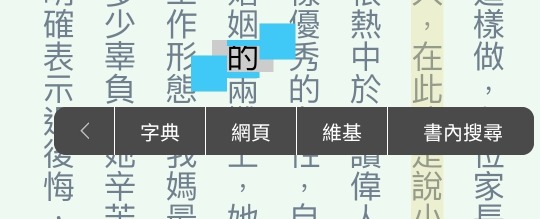
Reading Stats
Now, I'm a big dork and love to track my reading stats. To my great satisfaction, 讀墨 keeps track of some stats. The main one is time spent reading. You can set a daily goal (the minimum is 20 minutes), and if you reach it you get a nice checkmark on the calendar. The calendar doesn't update until the very end of each day, so if you've reached your goal for the day it won't show on the calendar until the next day.
Also, keep in mind time differences between where you live and Taiwan. I'm ~12 hours behind Taiwan, so the app doesn't start a new day until around noon for me.
Below the calendar, there's a chart that shows your total reading times for a week, month, or year. I normally can't be bothered to time my reading (especially not when I'm reading physical books) so this is cool to see. I think when it comes to reading in Chinese, being timed is more interesting because I'm able to more clearly gauge progress.


And below all that, there's a breakdown of the genres you read. I don't pay much attention to genre when choosing books, so I don't find this one quite as interesting.

(tfw you're reading a non-fiction book about a tutor so your main genre becomes 教育)
Overall Thoughts
So yeah, I've enjoyed myself so far. Aside from the reading interface, I find the app pretty easy to navigate. I spent a bit of time just clicking around and was able to figure out what's what pretty quick.
Like I said, this isn't a comprehensive review, but I'd recommend giving the app a try if you're willing/able to put down money for ebooks and are able to read traditional. It feels worth the money for me, since the interface is pretty customizable and easy to use.
If you're wondering where to find simplified ebooks, idk. This is my first real foray into Chinese ebooks, so I don't really know where to find them for simplified or traditional. I have heard that it is a little easier to pirate Chinese ebooks since their copyright laws are a little different than ours in the US?
#langblr#mandarin chinese#mandarin langblr#chinese langblr#learn mandarin chinese#learn mandarin#learn chinese#mine#books
57 notes
·
View notes